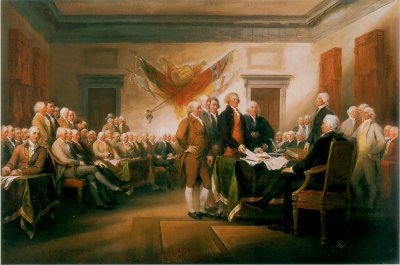Independence Day

The Declaration of Independence
IN CONGRESS, July 4, 1776.
The unanimous Declaration of the thirteen united States of America,
When in the Course of human events, it becomes necessary for one people to dissolve the political bands which have connected them with another, and to assume among the powers of the earth, the separate and equal station to which the Laws of Nature and of Nature’s God entitle them, a decent respect to the opinions of mankind requires that they should declare the causes which impel them to the separation.
We hold these truths to be self-evident, that all men are created equal, that they are endowed by their Creator with certain unalienable Rights, that among these are Life, Liberty and the pursuit of Happiness.–That to secure these rights, Governments are instituted among Men, deriving their just powers from the consent of the governed, –That whenever any Form of Government becomes destructive of these ends, it is the Right of the People to alter or to abolish it, and to institute new Government, laying its foundation on such principles and organizing its powers in such form, as to them shall seem most likely to effect their Safety and Happiness. Prudence, indeed, will dictate that Governments long established should not be changed for light and transient causes; and accordingly all experience hath shewn, that mankind are more disposed to suffer, while evils are sufferable, than to right themselves by abolishing the forms to which they are accustomed. But when a long train of abuses and usurpations, pursuing invariably the same Object evinces a design to reduce them under absolute Despotism, it is their right, it is their duty, to throw off such Government, and to provide new Guards for their future security…
Independence wasn’t really achieved until September 3, 1783 when Britain signed the Treaty of Paris, and, to be factual, our current government only dates from March 4, 1789 when the first government under our Constitution was installed.
Liberty was not extended to all men until December 6, 1865 with ratification of the Thirteenth Amendment abolishing slavery, nor were women given the one of the most important rights of men until August 26, 1920 with the ratification of the Nineteenth Amendment recognizing their votes.
In truth, until July 2, 1964 when Lyndon Johnson signed the Civil Rights Act into law, there was no mechanism to force government to recognize the rights of all American citizens.



































7 comments
When you consider when it was written and what it accomplished, it truly is an amazing document.
…I still get a bit goose-bumpy every year when I listen to the ensemble reading on NPR’s Morning Edition. This morning in particular, I couldn’t help reflecting for a moment on that part about “any form of government becoming destructive of these ends”, given the brutal swirl of events that have enveloped us. The courage of those men who signed their names to that document could stand as an object lesson to some of today’s national leaders…
The thing that people miss is that this was, in many ways, a suicide pact if the Revolution had failed. Everyone who signed the Declaration had marked themselves for a charge of treason, which would have ended with a noose.
They were willing to risk everything to maintain their rights, and we can’t even convince people to vote.
This was not a good holiday to despoil with the Libby clemency.
I recall some years ago explaining to a friend (when we were still in grad school) that Franklin was not engaging in hyperbole when he said, “We must all hang together, or assuredly we shall all hang separately.”
Hanging was a very real threat, as was the seizure of all assets, which would leave any children fatherless and destitute. It was a very dangerous position to take.
Hanging, torture, you-name-it, one or more of our founders experienced just about any kind of cruelty you could think of. Many finished their lives in poverty. One, whose name escapes me at the moment, is said to have authorized Washington to fire cannon at his own house, which the British had commandeered as a headquarters. Lives and fortunes were lost, as surely as sacred honor was kept.
Thirty months in Allenwood is a vacation compared to 30 days at Valley Forge or Iraq.